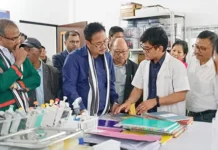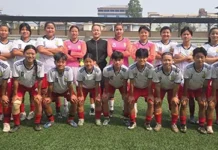RONO HILLS, 3 May: The Tribal Research Institute (TRI) organized a one-day workshop on ‘Sanitation among the Scheduled Tribes of Papum Pare district of Arunachal Pradesh’ at the conference hall of sociology department, RGU here on Tuesday.
The TRI project was funded by the union ministry of social justice and empowerment and ministry of tribal affairs and supported by social justice, empowerment and tribal affairs (SJETA) department, GoAP.
Dean of the faculty of social sciences prof. Sarit Kumar Chaudhuri suggested the principal investigators of project to explore cultural dimensions and indigenous knowledge system related to sanitation and hygienic practices among the tribal population.
He called for community-led approach for solving the problem of sanitation as government alone cannot resolve such a gigantic task.
Prof. Ananta Kumar Giri from Chennai based Madras Institute of Development Studies, while speaking on the topic “Issues of sanitation,” stated that ‘there is a need to develop culture of sanitation among the people for solving the problem related to sanitation.
He called for adopting innovative technology in designing sanitation space as conversational space.
TRI nodal office Dr. Bikash Bage informed that TRI was set up to carry out research studies on issues related to socio-economic development of tribal population of the state.
“The institute is taking up 8 research projects on various themes, of which reports on 6 projects have already been submitted to the funding agency,” Bage said.
The findings of the research project on sanitation were presented by principal investor of the project and associate professor Dr. Ashi Lama.
SJETA senior research officer Sailajan P. also spoke on the occasion.


